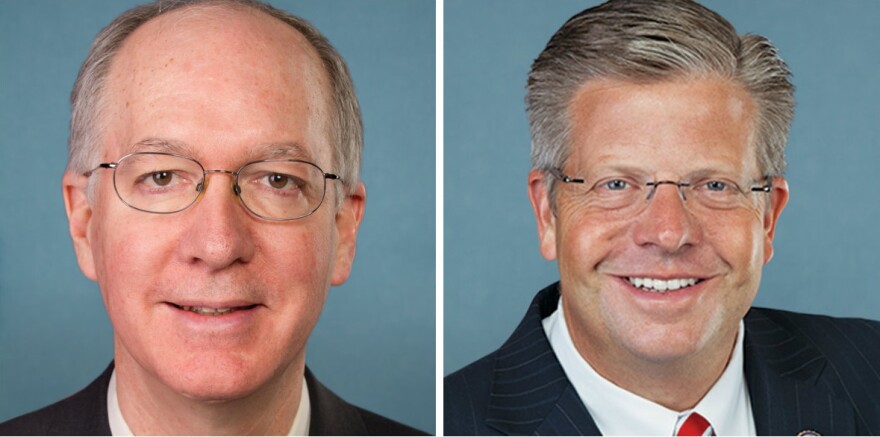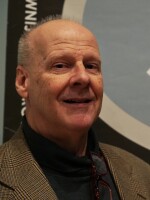This week’s WNIJ Friday Forum features two Congressmen who are entering their fourth terms representing parts of northern Illinois.
Democrat Bill Foster first won office in a special election for the 14th District Illinois Congressional seat vacated by Dennis Hastert when he retired in 2008. Foster went on to win the seat in the fall election. He lost in 2010 to Randy Hultgren. In 2012, Foster won the seat in the newly drawn 11th District, which zig-zags from Aurora in Kane and DuPage Counties through parts of Naperville and Bolingbrook to Joliet in Will County. He was re-elected in 2014 and 2016.
Republican Randy Hultgren first took office in 2010 when he defeated Foster for the old 14th District seat. He won the election in the redrawn 14th District in 2012, and re-election in 2014 and 2016. His district forms a large arc around part of the Chicago area, running from Lake and McHenry Counties on the Wisconsin border, through parts of DeKalb and Kane Counties and down to Kendall County, plus a small part of Will County.
Both Foster and Hultgren see the economy as a top priority. Hultgren wants to increase growth in several ways, starting with tax reform.
“I think another is regulatory reform, making sure that there’s some certainty in regulation, so that, especially small- and medium-sized business can grow and hire people,” he says.
Foster is worried about maintaining the economic growth that is already happening. He cites some of the actions taken or promised by President DonaldTrump as a cause for concern.
“I’m very worried about particularly the agricultural economy and the rural economy in America. President Trump campaigned on bringing 4 to 6 percent growth to rural America; but, in fact, his policies so far look like they will destroy the grain-export markets, and probably trigger a persistent collapse in grain prices, by things like pulling out of the Trans-Pacific Partnership, and so on,” he says.
Both see action on the Affordable Care Act as a top priority. Hultgren says he wants Congress comes up with something better.
“… making sure we’ve healthcare that patient focused, that gives people choices and options at a price they can actually pay,” he says.
Foster wants to retain most -- if not all -- of the ACA’s provisions. He says he worries that, in the drive to repeal and replace, some will disappear which could be devastating for tens of millions of people and, again, for the rural economy.
“So many rural hospitals and clinics were saved by the Affordable Care Act and the money that was provided to them, frankly, by taxing the wealthy. And now the Republicans, of course, want to repeal those taxes, but they have to find a solution to removing that money and watching that damage play out, or finding a substitute source of revenue to keep rural health systems alive,” he says.
Both say infrastructure is a top priority for the nation and Illinois, and one that could invite bipartisan cooperation. Foster says this is one area where he and other Democrats might work with President Trump. But both say they are waiting to see the details of any plan before they can say how they will react.
Foster says another top priority -- and one that, this year, hasn’t fallen along strictly party lines -- is protecting Social Security and Medicare from cuts.
“Which of course many Republican members of Congress have repeatedly voted for, but (which) President Trump campaigned strongly against,” he says.
He also sees the national debt as an issue that must be addressed.
Hultgren says strengthening the military and making sure the immigration process really does work for everyone also are priorities for Congress.
Each has a number of additional issues of concern. Both Hultgren and Foster say support for science -- including strong funding for the Fermilab and Argonne national labs – is very important. Hultgren says he’s already working on that.
“On the science committee that I serve on, I’ve got several pieces of legislation that we’ve introduced or going to introduce to modernize our national laboratories, to encourage the ability to move new innovation, new discovery, through the process, so that it can be something that to benefits people, benefits the public and benefits our economy,” he says.
Hultgren says he also supports efforts to advance supercomputing in the U.S.
But Foster says he is deeply concerned by statements about science by some in the new administration.
“When we see the Trump administration’s designee for the Office of Management (and) Budget, the guy who will be writing the budgets of the Trump administration, making statements, as he had not so long ago, that he doesn’t see the case for any federally funded research at all, then it gets a lot of people nervous about the long-term damage that that kind of thinking can do to our economy,” he says.
Hultgren also says a big issue for him personally is his work on human rights.
“I also am serving as co-chairman of the Tom Lantos Human Rights Commission. So a priority I have is to continue to fight for people who are persecuted for their faith or beliefs, their political beliefs, and highlighting that these voices are heard and that we as a Congress can do what we can to protect them, to find some relief for them. So we’ll be working diligently on the Human Rights Commission as well to be standing up for people here and all over the world. Also will continue to find fight for some change and some reduction in the number of people who are trafficked. Human trafficking is a scourge on our nation. It truly is modern-day slavery and it’s unacceptable, and so we need we need to everything we can to stop that,” he says.
Foster says the biggest challenge he sees in the months ahead is dealing with the many promises made by the new president.
“For example, his threats to walk away from the nuclear deal with Iran. If he goes through with that threat, we’re going to be facing -- within probably less than two years -- the choice of either having a nuclear-capable Iran, or going to war … neither of which is a very appealing prospect,” he says.
Foster calls some of the promises fraudulent. He cites the President’s promise to bring back manufacturing jobs.
“I think, if you look at those, they have been destroyed mainly by technology, not by Mexican imports or Chinese imports. And so, when you ask the Trump administration what is their plan, do they really intend to bring back jobs sewing shirts for two dollars an hour? Is that really his plan for the future for the workforce in America?,” he asks.
He says there is a problem, but having an honest discussion based on the facts is better than simply vilifying someone.
Hultgren sees the workload on Congress, driven by its own ambitious agenda and the White House, as the biggest challenge. Part of that challenge is that, while the House can work quickly, the Senate does not.
“And then, I think, trying to find ways to come together to solve problems. That recognizing that a lot of the big challenges we’re going to face are going to require 60 votes in the Senate, so we might as well start working and trying to get bipartisan support both here in the House and in the Senate. That’s something that’s been very important to me. With every piece of legislation that I file, before I even file it, I make sure that I have Democratic co-sponsorship, or do my best to see that we have that, and hopefully have several Democratic co-sponsors on that, with the knowledge of knowing that really important, big things will only get done if there is bipartisan support; and we’ll be able to get it through the Senate with that support,” he says.
Both Foster and Hultgren say, despite obvious policy differences on a number of issues, they do manage to work across the aisle. In the field of financial services, both say that working on the financial services committee, as it deals with the complexities of regulating the industry in a balanced way has been productive.
Hultgren says science education also has been a bipartisan topic.
“STEM education, science, technology, engineering and mathematics. I’m co-chairman of the STEM Caucus with Dan Lipinski, Democrat from Illinois. He and I are very good friends, work together on many issues on the Science Committee, but also are teaming up, working together on the STEM Caucus,” he says.
Asked what they tell their constituents about the process and how those constituents should deal with it, both Foster and Hultgren say engagement is key for both voters and their representatives. Foster says people need to be alert.
“… and I think whenever someone sees something that makes an impression on them, their first question has to be, ‘What is the evidence for that?’ And not just take it at face value because someone tweeted it at them, but actually look at the facts. Go to the fact-checking organizations who provide a crucial role in getting to the truth and highlighting the evidence that has to be the basis for our political debates,” he says.
And he says that, if people are really concerned, they should get more involved -- even run for office, at any level.
Hultgren says, on the flip side, the message of the last election was that politicians need to listen closely to the people they represent, and make sure those views are acknowledged. Hultgren says he likes to talk to his constituents, who may be worried or frustrated about what’s happening in Washington, about the Constitution.
“It’s something that is so solid and do strong, and really continues to be a road map of how government ought to work. A government that our founders feared would – they didn’t want it to be too powerful, they didn’t want one person to have too much authority. And so the checks and balances are there, we just have to make sure that they work,” he says.
Hultgren says that, if each branch does its job and finds ways to work together with the other branches, while at the same time living within the restraints clearly outlined in the Constitution, good things will happen for the country and the people those in Washington represent.






